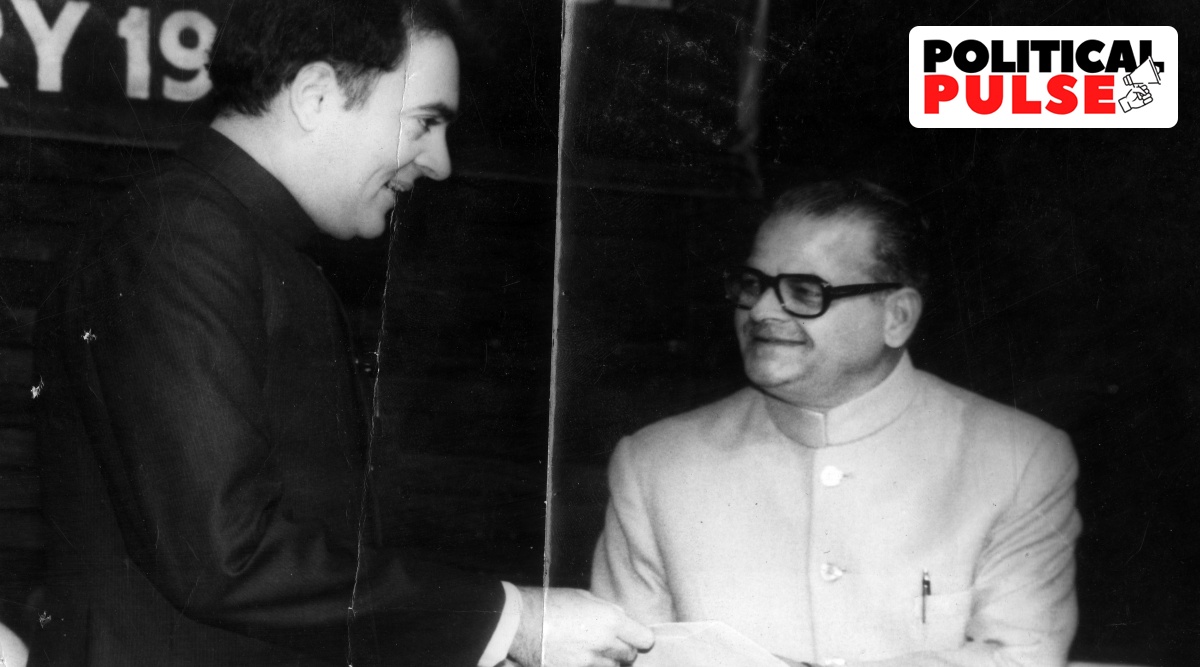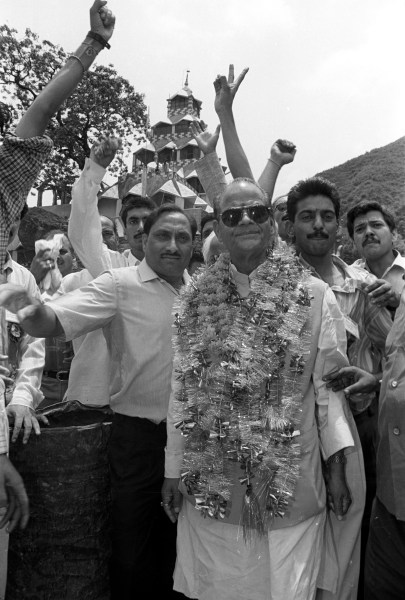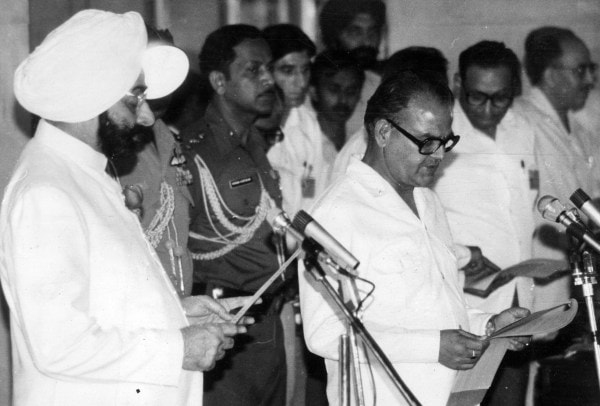 Sukh Ram, Minister of State for defence Production and Supplies, with Prime Minister Rajiv Gandhi. (Express archive photo)
Sukh Ram, Minister of State for defence Production and Supplies, with Prime Minister Rajiv Gandhi. (Express archive photo)“Abhi phone ki ghanti nahin bajegi (The phone won’t ring any more).”
That’s how Ashray Sharma announced the death of his grandfather Pandit Sukh Ram, 95, early Wednesday morning. And that is how the gentle and soft-spoken politician will always be remembered in Himachal – as the man who brought telephones to every nook and cranny in the hill state with its difficult topography.
Sukh Ram was the Union Communications and Information Technology Minister in the P V Narasimha Rao government from 1993 to 1996, when economic reforms were underway. As telephone connections started reaching homes, and landlines made way for mobile phones, Sukh Ram ensured that the telecom revolution also took root in his state Himachal, to its remotest and highest villages. Sukh Ram himself hit several lows after that, but Himachal never forgot this.
Prof Ramesh Chauhan, a political scientist at Himachal Pradesh University (HPU), recounts how almost no one from the state who applied for a connection was denied it. “Remember, those were the days of the licence raj and a landline was a big thing. But Pandit ji would okay every connection in less than a fortnight. I have personally experienced this. People started calling him telephone mantri.”
Best of Express Premium
 Pandit Sukh Ram launching Himachal Vikas Party on July 6, 1997 in Mandi. (Express archive photo by Swdesh Talwar)
Pandit Sukh Ram launching Himachal Vikas Party on July 6, 1997 in Mandi. (Express archive photo by Swdesh Talwar) It was telecom that also led to the scandal that would forever taint him. In 1996, Sukh Ram fell from grace when his houses at Mandi in Himachal Pradesh and New Delhi were raided by the CBI, leading to the recovery of huge amounts of cash. Sukh Ram continued to fight a legal battle on one hand and a battle for his political survival on the other after this episode, which also led to his expulsion from the Congress.
Born in July 1927 into a poor family of 10 children in Kotli, 22 km from Mandi, Sukh Ram distinguished himself in studies and after doing law in Delhi, started a legal practice in the Mandi district law courts in 1953. He made his first foray into politics nine years later when he became a Member of the Territorial Council (the precursor to the state Assembly).
He went on to become one of the most influential Brahmin leaders of the state – they comprise 20% of Himachal’s population – winning five Vidhan Sabha and three Lok Sabha elections. Till the very end, he was known as a people’s politician, with an open house for one and all. But he could never fulfil his dream of becoming chief minister.
Chauhan says that in 1983, when the Congress had to replace then sitting CM Ram Lal due to a corruption case, the high command as well as the legislators were behind Sukh Ram, as he was active in state politics, but Ram Lal lobbied for Virbhadra Singh, who was then a Union minister, and the high command agreed.
That set off one of the longest running political rivalries in the history of the state, between Virbhadra and Sukh Ram. Chauhan says it also led to the division of the Congress into two camps – one with Sukh Ram, Vidya Stokes; the other with Virbhadra.
 President Giani Zail Singh administering the oath of office and secrecy of the Minister of state for defence to Sukh Ram at Rashtrapati Bhawan in New Delhi on September 25, 1985. (Express archive photo)
President Giani Zail Singh administering the oath of office and secrecy of the Minister of state for defence to Sukh Ram at Rashtrapati Bhawan in New Delhi on September 25, 1985. (Express archive photo) In 1993, Sukh Ram again lost out. While then PM Rao was keen on making him the CM, the MLAs rallied behind Virbhadra. “For three days, there could be no oath-taking as Virbhadra refused to accept a berth in the Union ministry (in place of CM post),” recounts Chauhan.
Regardless of their tussle for the top job in Himachal, the two maintained civility in their interpersonal relations. “They did not let it vitiate their personal space,” says Kamal, a retired professor from HPU.
But it did have a bearing on the political history of Himachal. After his expulsion from the Congress in 1996, Sukh Ram and his son Anil Sharma, then an MLA from Mandi, formed the Himachal Vikas Congress and entered into a post-poll alliance with the BJP in 1998. Thanks to Sukh Ram’s support, not only did Prem Kumar Dhumal become CM, it also became the first BJP government in the state to last a full term. The Congress lost out as it refused to accede to Sukh Ram’s condition of keeping Virbhadra out of it.
All through, Mandi remained Sukh Ram’s fiefdom. He retained the Mandi Assembly seat for over two decades from 1963 to 1984, when he successfully contested the Lok Sabha elections and was made a Minister of State for Defence Production and Supplies, Planning and Food and Civil Supplies, in the Rajiv Gandhi government.
In 1998, two years after the cash seizures, he won the Assembly polls from Mandi Sadar again, with a margin of over 22,000 votes, the highest in the state. In the run-up to the 2004 Lok Sabha elections, he returned to the Congress.
Come 2017, prior to the Himachal Assembly elections, Sukh Ram joined the BJP along with his son Anil and grandson Ashray. The BJP went on to win nine out of 10 seats in Mandi district, attributed to Sukh Ram’s influence.
Two years later, Sukh Ram again joined the Congress, publicly burying his differences with Virbhadra. At a rally in Mandi in 2019, he said he had met Virbhadra in Delhi and had apologised to him. “I asked him for forgiveness for any mistakes that I might have committed,” he said and burst into tears.
Later, grandson Ashray unsuccessfully contested the Mandi parliamentary seat on Congress ticket. Another of Sukh Ram’s grandsons, Aayush Sharma, is an actor married to superstar Salman Khan’s sister.
In 2021, Virbhadra’s widow Pratibha Singh won back the Mandi Lok Sabha seat from the BJP in a bypoll, by a huge margin of 1.36 lakh votes, again due to Sukh Ram’s help. “Though he was too frail to campaign in person, he issued an appeal to the electorate to vote for Pratibha Singh,” says Kamal.
While the voters seemed to not care, the case of the cash seizure continued to haunt Sukh Ram most of his life. In 2011, when he was 84, a Delhi court sentenced him to five years in jail. Later in 2012, he surrendered and went to jail but was bailed out by the Supreme Court in two days.
He once told this paper, “Despite the fact that age is not on my side, I have not lost hope for justice. I am the victim of a political conspiracy. My fight will continue till I come out clean from the court of law.”
In 2018, he had approached the apex court, pleading that he did not want to die with this taint. The case is pending there.
- The Indian Express website has been rated GREEN for its credibility and trustworthiness by Newsguard, a global service that rates news sources for their journalistic standards.

